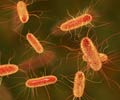The worst of a killer bacteria outbreak was over, according to indications coming out of Germany

"I can't yet cancel the warnings, but we now have reasons to hope as the number of new infections is continuously dropping," he said some five weeks into the outbreak.
"There will likely still be new cases, and we must unfortunately still reckon with new deaths, but the number of new infections is clearly dropping, and the worst of the illness is behind us," he added.
The Robert Koch Institute, Germany's national health centre, said in a report on Tuesday that available data "suggests a light decrease in the number of new cases".
Confirmed infections in Germany stood at 2,325 on Monday in the latest count, with 75 percent of cases in the north and northwest of the country, the institute said in a statement.
All but one of the 24 deaths has been in Germany, with the remaining fatality a women in Sweden who had just returned from Germany.
Advertisement
Dalli called in an interview with Die Welt newspaper for closer cooperation between German and foreign experts in fighting the outbreak which has seen people fall ill in more than a dozen countries.
Advertisement
"I cannot overstate how important it is that we should all closely cooperate and share our common knowledge to bring to an end this outbreak as fast as possible," he added.
In Germany criticism of the government's response has grown.
Despite widespread testing of foodstuffs, restaurants and farms, authorities to date have been unable to trace the origin of the outbreak.
Lower Saxony agriculture minister Gert Lindemann said authorities had failed to find traces of contamination at a local organic farm producing sprouts on which suspicion had fallen at the weekend.
But he did not rule out it could still be the source of the outbreak of the virulent E. coli bacteria, saying that three of the farm's employees took ill last month with tell-tale diarrhoea.
The Berlin director of the Max Planck Institute for biological infection, Stefan Kaufmann, meanwhile criticised the government's contradictory public warnings, telling Die Welt this "worried people unnecessarily".
"The government should appoint a commissioner for global health" to deal with such infections, he also said.
The scare has led puzzled officials to warn consumers off raw tomatoes, cucumbers, lettuce and sprouts, prompting the European Commission to ask EU states for 150 million euros ($220 million) in aid for hard-hit farmers.
European agriculture commissioner Dacian Ciolos urged Germany to quickly pinpoint the driver of the lethal bacterial strain, warning that consumers were losing confidence every day the outbreak remains a mystery.
"Without this answer, it will be difficult to regain the trust of consumers, which is essential for the market to regain its strength," he said at emergency talks in Luxembourg on Tuesday.
Belgian Agriculture Minister Sabine Laruelle estimated losses to EU farmers "in the hundreds of millions of euros" after countries such as Russia banned vegetable imports and European consumers turned their backs on greens.
The Russian ban was expected to figure prominently at a summit meeting Thursday of EU and Russian leaders.
The EU has called for Russia to immediately lift the ban, which it said was disproportionate and lacking a firm scientific basis.
Source-AFP



![Genetically Modified Food / Genetically Modified Organism [GMO] Genetically Modified Food / Genetically Modified Organism [GMO]](https://images.medindia.net/patientinfo/120_100/Genetically-Modified-Food.jpg)






